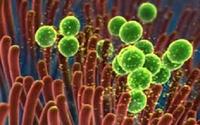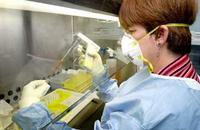-
Remote satellites-based early warning system for cholera epidemics

Researchers have established new techniques – based on remote satellites imagery — for predicting the severity of seasonal cholera epidemics months before they occur and with a greater degree of accuracy than other methods based on remote satellite imaging. The findings of the research may provide the essential lead time to strengthen intervention efforts before the outbreak of cholera in endemic regions.
-
-
The U.S. Food Emergency Response Network (FERN) tries to keep food safe
The U.S. Food Emergency Response Network (FERN) has 172 laboratories, including 39 federal, 113 state, and 17 local labs across the states and Puerto Rico. Randy Layton, FERN director, discussed the agency’s work in a July meeting of the International Association for Food Protection (IAFP).
-
-
Climate change was proximate, not primary, cause of 2012 Great Plains drought: study

From May to July 2012, the Great Plains region of the western United States faced a powerful and unpredicted drought. Following seven months of normal rainfall, the drought was one of the largest deviations from seasonal precipitation rates seen in the region since observations began in 1895. Researches find that the drought fell within the bounds of natural atmospheric variability. The strength of the drought, they suggest, was a consequence of the multiple complex nonlinear systems that make up the climate system and did not critically depend on the existence of a strong external forcing.
-
-
Bacteria in drinking water are essential to keeping it clean

Researchers point the way to more sophisticated and targeted methods of ensuring our drinking water remains safe to drink, while still reducing the need for chemical treatments and identifying potential hazards more quickly.
-
-
Lawmakers, scientists question FBI’s investigation, conclusion in 2001 anthrax attacks

Twelve years after the fall 2001 anthrax attacks, and six years after the 2007 FBI’s determination that Bruce Ivins, a top government anthrax researcher at the U.S. Army Medical Research Institute of Infectious Diseases (USAMRIID), was the perpetrator of the attacks (Ivins died in 2008 of apparent suicide), lawmakers and USAMRIID scientists insist that the FBI’s conclusions are not supported by scientific evidence – indeed, that some basic scientific facts make the Bureau’s conclusions untenable.
-
-
Imported food: Shifting from catching problems at the border to preventing them at the source
The Association of Food and Drug officials (AFDO) has published its guidance document for improving imported food safety. The document, entitled “Issues and Concerns with Imported Foods,” was released ahead of the U.S Food and Drug Administration’s (FDA) release of two rules on the same issue. The FDA aims to shift from a regulatory system that focuses on catching problems at the border and into a prevention system to correct issues before they reach the American border.
-
-
Scientists develop safe method for research on deadly flu viruses

In 2012, scientists around the world agreed to a worldwide, yearlong voluntary moratorium on research into the deadly H5N1 bird flu. The ban came after several scientific teams successfully altered the H5N1 viral genome to enable airborne transmission of the bird flu between ferrets — mammals considered a good research model for humans. The public health concern was that altered H5N1 could escape the lab, infect and spread among humans, producing a global pandemic. There was also concern that terrorists would use the altered H5N1 viral genome in large-scale bioterror attacks. Researchers have now been able to turn molecules in human lung cells into viral scissors that cut H5N1 bird flu and similar bugs into pieces. This dismantling of the viral genome in human lung cells will ensure safe research on deadly strains of influenza.
-
-
In arid regions, irrigation can increase malaria risk for a decade
Malaria risk in arid regions often rises when irrigation is introduced, due to increased amounts of standing water that serve as mosquito breeding sites. Globally, the number of people at risk of contracting malaria due to proximity to irrigation canals and related infrastructure has been estimated at 800 million, which represents about 12 percent of the global malaria burden. New irrigation systems in arid regions benefit farmers but can increase the local malaria risk for more than a decade — which is longer than previously believed — despite intensive and costly use of insecticides, a new University of Michigan-led study in northwest India concludes.
-
-
Groundwater in Vietnam threatened by a new source of arsenic
In Southern Asia, an estimated 100 million people have been exposed to risks from groundwater contaminated with naturally occurring arsenic. The tainted water, used for drinking, agriculture, and industry, has resulted in a variety of serious health risks, including cancer. “Dig deep” to avoid naturally occurring arsenic contamination has been promoted as an answer to obtaining safe water in South Asia, but arsenic has been found in numerous deep wells drilled in the Mekong Delta region of southern Vietnam.
-
-
Effective screening of airline passengers arriving from areas of infectious disease outbreaks
New study shows that exit-screening at thirty-six airports would have assessed all air travelers at risk of transporting H1N1 out of Mexico at start of 2009 pandemic. Screening at 99 percent of the world’s international airports could have been forgone with negligible missed opportunities to prevent or delay the spread of disease. Screening at just eight airports worldwide would have led to the assessment of 90 percent of all at-risk air travelers.
-
-
Controlling contagion by restricting mobility
In an epidemic or a bioterrorist attack, the response of government officials could range from a drastic restriction of mobility — imposed isolation or total lockdown of a city — to moderate travel restrictions in some areas or simple suggestions that people remain at home. Deciding to institute any measure would require officials to weigh the costs and benefits of action, but at present there is little data to guide them on the question of how disease spreads through transportation networks. A new MIT study shows that in the face of an epidemic, even moderate government-mandated travel restrictions would slow contagion.
-
-
CDC: Action needed now to halt spread of deadly, antibiotics-resistant bacteria
Data show more inpatients suffering infections from bacteria resistant to all or nearly all antibiotics. CDC says that the findings are a call to action for the entire health care community to work urgently — individually, regionally, and nationally — to protect patients. During just the first half of 2012, almost 200 hospitals and long-term acute care facilities treated at least one patient infected with these bacteria.
-
-
Superbug crisis shows progress in antibiotic development “alarmingly elusive”
Despite the desperate need for new antibiotics to combat increasingly deadly resistant bacteria, the U.S. Food and Drug Administration (FDA) has approved only one new systemic antibiotic since the Infectious Diseases Society of America (IDSA) launched its 10 x ’20 Initiative in 2010 — and that drug was approved two and a half years ago.The IDSA says that time is running out for meeting the IDSA Goal of ten new antibiotics by 2020.
-
-
Climate change threatens world food security
The last few decades have witnessed a substantial decline in the number of hungry people worldwide. Since 2007, however, progress has slowed and world food supply and demand have been precariously balanced — climate change threatens to tip this balance, most dramatically in the poorer areas of the world.
-
-
Lawmakers criticize FDA, CDC for Cyclospora outbreak foot-dragging
Lawmakers want to know why it has taken so long for food-safety authorities to respond to the cyclospora outbreak which, so far, has sickened at least 418 people in sixteen states. They also want to know why the FDA and CDC have been tight-lipped about the specific products carrying the parasite — health authorities in Nebraska and Iowa have pointed to bagged salad containing romaine and iceberg lettuce as well as carrots and cabbage as the source – and who is the manufacturer of the contaminated products.
-
More headlines
The long view
We Ran the C.D.C.: Kennedy Is Endangering Every American’s Health
Nine former leaders of the Centers for Disease Control and Prevention (CDC), who served as directors or acting directors under Republican and Democratic administrations, serving under presidents from Jimmy Carter to Donald Trrump, argue that HHS Secretary Roert F. Kennedy Jr. poses a clear and present danger to the health of Americans. He has placed anti-vaxxers and conspiracy theorists at top HHS positions, and he appears to be guided by a hostility to science and a belief in bizarre, unscientific approaches to public health.
